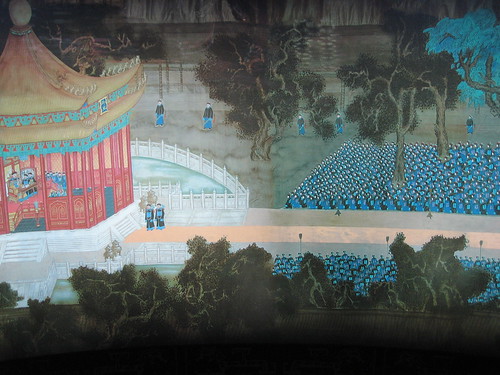Guess who’s in Bejing! Well, not me anymore since I just left1 I snuck away from my conference for a bit to go to the Confucian temple and the Yonghe temple, neither of which I had seen in years. Yonghe is still pretty much the same, although 15 years ago there were not so many stores clustered around it selling incense and Buddhist tcotchkes. Actually, I think 15 years ago there were basically none, and now there are zillions of them. The Confucian temple and the adjacent Imperial University were more interesting however. Last time I was here they were pretty sparse, and there were not many people there. There were still not many people. Confucian temples are always nice and quiet, and a nice place to look at old trees. The exhibits had been updated, however, and there was a lot of stuff on Confucianism and its role in Chinese society. Since I like public history it was interesting to me, especially since most Chinese my age would have gotten no Confucianism at all in school, so it was cool to see this attempt to retro-fit it into the visitors. As you might expect, Confucianism was not really shown as developing, it was just created and remained unchanging, and the ascribed the ideas of a lot of later Confucians, or just Chinese customs, to the Big C. Confucianism was the essence of Chinese society, and still is (Which was not what they would have said 15 years ago) and Confucius inspired both the scientific method and the industrial revolution. Like most of these “”5000 years of culture Hooray!” things it was pretty overdone, but still very professional and detailed. They are getting pretty good at this.
In the University they had an exhibit of sorts on the Qianlong emperor’s lectures to his officials, which happened here. You may not have know that Qianlong was actually a teacher. Here is his office door.

His office

His desk

One of his classes.

Hmm. Seems a bit ornate for a Faculty member. Of course, Qianlong was really an Administrator, so I guess even if he did give the occasional lecture you might expect him to be a little better taken care of than the average temp. One thing I wondered about was if these lectures were a Qianlong innovation. I don’t think I have read anything about them, and I have read that Chinese emperors were quite different from Early Modern European monarchs, in that the Europeans were constantly on display and performing ritually in front of the ‘public’ (mostly the court). Chinese emperors were supposedly far less in the public eye, and these lectures would seem to be something that would tie in with the Southern Tours and other aspects of Qing imperial performance. Maybe I will check Zito when I get home.
although I think there are still -some- people left in Beijing ↩
Definitely an administrative post!
Were Qianlong’s lectures his, on the model of the scholars’ presentations to the Emperor from previous dynasties, or were they essentially presentations of Imperial decrees which were written by the secretariat?
I was at the Confucian Temple last week and found the twisting of Confucian thought to describe modern China and the CCP’s agenda more than a little funny. Apparently Confucius thought that before a society reaches “great harmony” it must first attain “moderate prosperity”. The panel I’m referring to is at http://twitpic.com/h5ym1.
But Confucius – according to http://www.hoover.org/publications/policyreview/17111106.html, at least – described moderate prosperity as negative, a state “where coercive rulers barely contained the effects of people’s unbridled pursuit of their own self-interest.”
Thoughts?
I was at Yonghe two months ago, and I couldn’t for the life of me figure out how all those incense stores could possibly stay in business.
Johnathan,
I’m not really sure what the content was. Probably just a more literate version of the Sacred Edict or something.
CP.
Incense is like tropical fish. Your customers always need more.